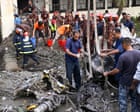
In a tragic incident in Dhaka, Bangladesh, a routine training exercise involving a military jet turned into the nation’s most devastating aviation disaster in decades. An F-7BGI fighter jet, a Chinese-made aircraft, encountered a technical problem shortly after taking off. In the unfortunate turn of events, the distressed jet collided with the Milestone school campus situated in the capital city just as students were concluding their afternoon classes. Witnesses present during the incident described the jet plummeting into a five-storey educational building. The crash’s impact led to a fiery explosion and subsequent fire that further engulfed a two-storey structure on the campus. The repercussions of this accident are heartbreaking, with the death toll reaching at least twenty individuals, including the pilot, and nearly two hundred others sustaining injuries—many of whom are children.
At the heart of the commotion lies the profound concern for the affected families and the broader community grappling with this sudden calamity. Emergency response teams swiftly arrived on scene, providing medical attention to the injured and working tirelessly to manage the fire caused by the explosion. Families and members of the local community have joined together in support, offering assistance and solace to those directly impacted by the tragedy. Authorities are focusing their efforts on investigating the mechanical failure that led to this catastrophic event, while also prioritizing the healing and recovery of the affected individuals.
Meanwhile, across the globe in Italy, a contrasting cultural narrative is unfolding amid a wave of public criticism. Authorities in Italy have cancelled a scheduled performance by a prominent pro-Putin conductor at the esteemed Un’Estate da Re classical music festival. This festival is curated and funded by authorities in the Campania region, known for attracting diverse and globally recognised talent. The conductor’s previously expressed support for Russian leader Vladimir Putin stirred public upset, leading to calls for a reassessment of his participation in the festival. As discussions flourished, the decision to move forward without the conductor’s scheduled performance was made in the interest of maintaining cultural harmony amidst an increasingly sensitive geopolitical climate.
The choice made by the festival organisers reflects a broader societal sentiment and responds to the concerns brought forth by critics and cultural enthusiasts alike. Notably, this cancellation underscores the significant intersection of arts and politics in today’s society and highlights the importance of curatorial choices aligning with public sentiment and ethical standards.
This week, as Bangladesh mourns the unexpected loss of lives and the Italian cultural sector navigates the intricate relationship between art and politics, both situations remind us of the resilience and unity that emerge in times of trial and controversy. As investigations proceed and resolutions are sought, the thoughts of the global community are with those affected by both the tragic accident and unfolding cultural debates, all hopeful for healing and understanding in the days to come.
Source: {link}
